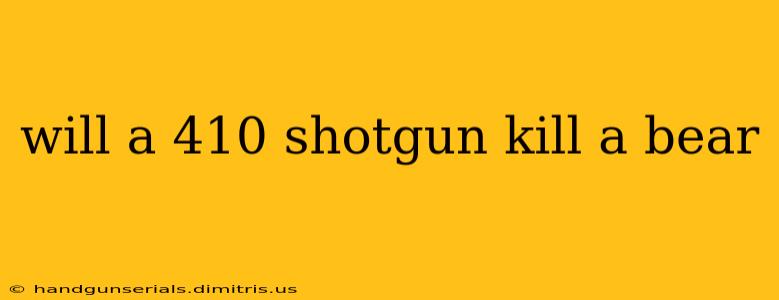Will a .410 Shotgun Kill a Bear? A Detailed Look at Self-Defense Against Bears
The question of whether a .410 shotgun can kill a bear is complex and the answer is a resounding maybe, but with significant caveats. While it's possible under specific circumstances, it's far from ideal and relying on a .410 for bear defense is generally strongly discouraged. Let's delve into the specifics.
Understanding the Limitations of the .410 Gauge
The .410 bore shotgun is the smallest gauge commonly available. This translates to a significantly smaller projectile than those found in larger gauges like 12 or 20 gauge. While a well-placed shot can kill a bear, several factors dramatically reduce its effectiveness:
-
Limited Stopping Power: The smaller shot size and lower energy transfer compared to larger gauges means that a .410 is less likely to deliver the immediate incapacitating blow needed to stop a charging bear. Multiple shots might be required, increasing the risk to the defender.
-
Shot Pattern Dispersion: .410 shot patterns tend to spread more rapidly than larger gauges, potentially reducing the effective range and the concentration of shot impacting the bear's vital areas. This is especially crucial at close range where a wider pattern might not be as effective.
-
Projectile Energy: The reduced energy translates to a lower probability of penetration, particularly through thick fur or bone. A bear's thick hide and muscular build require substantial stopping power.
Factors Influencing Lethality
Even with these limitations, the lethality of a .410 against a bear is dependent on several unpredictable factors:
-
Shot Placement: Accurate, precise placement in vital organs (heart, lungs, brain) is paramount for any firearm, but it's crucial with a .410. A poorly placed shot is far less likely to be effective.
-
Bear Size and Species: A smaller bear presents a different challenge than a massive grizzly or Kodiak bear. The size and aggression of the bear significantly impact the effectiveness of any firearm.
-
Ammunition Type: Using slugs instead of shot increases the .410's potential, but even slugs offer considerably less stopping power than those from larger gauges.
-
Range: The effective range of a .410 is significantly shorter than that of a larger gauge shotgun, limiting its usefulness in a bear encounter.
Safer Alternatives for Bear Defense
Given the limitations of the .410, consider these superior options for bear defense:
-
12 Gauge Shotgun: The 12 gauge is the most commonly recommended firearm for bear defense due to its superior stopping power and range.
-
Large Caliber Handguns: Certain large caliber handguns (.44 Magnum, .454 Casull, .500 S&W Magnum) offer a more substantial alternative to the .410, but require significant training and practice.
-
Bear Spray: Bear spray is often considered the first line of defense against bears and is highly effective when used correctly. It's lightweight, non-lethal, and requires less training than firearms.
Conclusion: A .410 is Not Recommended
While theoretically possible, relying on a .410 shotgun for bear defense is highly risky. The reduced stopping power, limited effective range, and increased risk of multiple shots needed increase the chance of injury or death to the individual using it. Prioritize bear safety education, bear spray, and a larger caliber firearm for truly effective bear defense. Always consult with wildlife experts and experienced firearms instructors for guidance tailored to your specific location and potential bear encounters.

